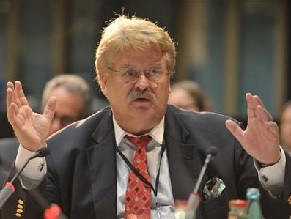|
World Jewish News

MEP Elmar Brok.
|
MEP Elmar Brok on Syria: 'Negotiations will still be needed despite any military action'
29.08.2013, Israel and the World The chairman of the European Parliament foreign affairs committee said negotiations will still be needed to find a permanent solution for Syria despite any military action that might be taken.
Speaking Wednesday after a special meeting of the committee on the situation in Syria and Egypt, German Christian-Democrat MEP Elmar Brok also condemned the use of chemical weapons in Syria and criticised China and Russia for not doing more to help find a peaceful solution.
“Even if a military strike comes, we believe that a political solution still is needed. It should not be the result that at the end of the day there is a fundamentalist government which might even be worse than what was there before,” he declared.
He also hit out at the alleged use of chemical weapons in Syria: “It is unacceptable to use mass destruction means like it were used there and this indeed are red lines that are for the international community not acceptable.”
European Parliament President Martin Schulz warned against rushing into military action. “No to hasty and unilateral intervention in Syria. International community has to act together and on the basis of UN report's results,” he said.
In London, as British lawmakers prepared to debate a possible military intervention in Syria, Prime Minister David Cameron said Britain would propose a resolution at the United Nations on Wednesday accusing the authorities in Damascus of responsibility for a chemical weapons attack one week ago and authorizing “all necessary measures” to protect civilians.
The resolution, to be circulated among the five permanent members of the Security Council, came as the momentum toward retaliatory military action gathered pace in the West.
Cameron said Britain had “drafted a resolution condemning the chemical weapons attack by Assad” and “authorizing necessary measures to protect civilians.”
“We’ve always said we want the UN Security Council to live up to its responsibilities on Syria,” he wrote in a tweet.
A spokeswoman for Cameron, speaking in return for anonymity under departmental rules, said the British draft proposed invoking Chapter Seven of the United Nations Charter, which can be used to authorize the use of force “to maintain or restore international peace and security.”
Britain’s latest move seemed to be designed to lay the diplomatic groundwork for action by a coalition of outside forces, led by the United States, if there was no consensus at the United Nations.
by: Yossi Lempkowicz
EJP
|
|
